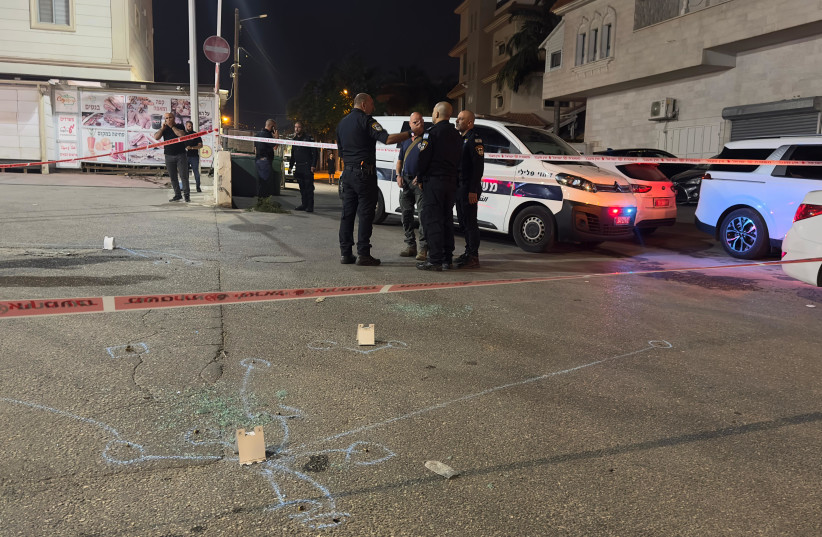Israel has experienced an unprecedented number of murders this year, most of them concentrated in Arab minority communities and many linked to criminal elements. With more than 150 people killed so far in 2023, leading politicians have weighed in on what must be done next.
Prime Minister Benjamin Netanyahu met with a subcommittee that is tasked with advancing the fight against crime in the Arab sector, and has said that it is unacceptable that this community suffers from acts of murder and violence. Legislation has been slow to confront various symptoms and causes of this phenomenon, such as businesses being extorted to pay “protection.” The threat posed to Israeli society is now growing, and a new phase could emerge.
There have been calls to involve the Shin Bet (Israel Security Agency) in more investigations inside Israel, essentially admitting that the tools Israel has used to confront extremist groups and security threats are needed because of the tidal wave of shootings and crime. At the same time the number of killings continues to grow, targeting civilians and also politicians now in some communities.
The rising violence and presence of illegal weapons creates a nexus that has been seen in other countries in which rising criminality and lawlessness can also lead to extremist groups exploiting a vacuum left by the lack of government control.
How is crime linked to terrorism?
It’s worth noting here two related issues. In the past, certain incidents in Israeli society were labeled “criminal” when they were in fact the result of terrorist or extremist groups. Sometimes this is described in the media as a “nationalist” motive compared to a “criminal” motive. It is not always easy to see the difference.

During the conflict with Gaza in May 2021, violent incidents took place in some “mixed” cities in Israel. In Lod, reports characterized the violence as leading to a collapse of institutions and law and order and even a “civil war.” An article in 2022 titled “Israel needs to talk about the Arab riots of May 2021” provides a discussion of the competing narratives about the clashes, and hints that radicalization that may occur as a result.
The link between terrorism and organized crime is well known. A 2008 paper in the journal International Security noted that “understanding international organized crime and terrorism in terms of networks has become a widely accepted paradigm in the field of international relations.” That article pointed out recent research showing that states are now confronting powerful threats from non-state groups like al-Qaeda or international criminal organizations, and that states might be losing the battle. It pointed to threats in places like Colombia or Mexico, but also how networks extend to Pakistan, North Korea, and other places.
It’s widely believed today that groups like ISIS are on the decline. The era of chaos unleashed by 9/11 and the global war on terrorism has passed and now powerful states have returned to the Middle East, for instance. However, in places like the Sahel, a swath of territory from Somalia to Senegal is threatened by extremist groups. These groups are gobbling up territory in countries like Mali.
An article in the International Journal of Criminology in 2019 noted that: “disagreements have deepened as to under what conditions terrorists and criminals collaborate or when and why terrorists decide to develop their in-house capacity to implement criminal activities.”
It noted that there is a debate between whether the “crime-terror nexus flourishes in weak states or if, on the other hand, technological advancement in richer countries provides the necessary infrastructure (roads, telecommunications, etc.) for successful collaboration.”
Israel in this case would represent a richer country with advanced technology. However, the extremist networks feed off weaker areas, such as the Palestinian Authority’s collapse of control in Jenin, or the threats posed by Hamas in Gaza and Hezbollah in the weak state of Lebanon. Indeed, the relative weakness of the Syrian state may lead to criminal-terrorist activity in southern Syria, with Iran-backed gangs trading in Captagon threatening Jordan.
Many well known terrorist attacks in Europe were carried out by men with criminal backgrounds. The ability of these men to move in and out of the worlds of crime, on the periphery of society – in places like the Banlieus of France – and then commit attacks, is well known. Research has also revealed this to be the case in extremist terrorist networks in Holland. Articles at Clingenael Institute have also focused on this “crime-terrorism nexus,” and the West Point Combatting Terrorism Center has spotlighted this issue as well.
Considering the widespread focus on how crime and criminal networks can also be linked to extremist groups, it appears that Israel’s security concerns regarding rising violence in parts of Israeli society, particularly in minority community areas, is a natural area of concern for what might come next.
An article at the Institute for National Security Studies in July 2022 focused on Hezbollah’s “modus operandi of intelligence agents” in Israel, noting that “enlistment in Hezbollah took place in a variety of forms. Out of the 10 enlistment initiatives on the part of [discovered Hezbollah operatives], half were related to drug trafficking. The defendants made contact with criminal elements in Israel (who knew drug traffickers in Lebanon), or with Lebanese drug traffickers, in order to smuggle drugs into Israel, and their connection with Hezbollah developed out of this activity.”
The threat of extremist groups working with criminals in Israel is already clear. The rise of violence, the discussion of how to confront it, and recent threats against officials and civilians, illustrate the emerging threat of a new phase of terrorism.•
